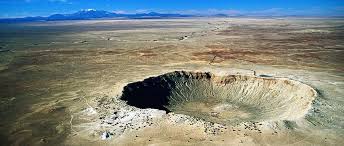crater
英 [ˈkreɪ.tər]
美 [ˈkreɪ.t̬ɚ]
- n. 火山口;弹坑
- vt. 在…上形成坑;取消;毁坏
- vi. 形成坑;消亡
使用频率:

记忆方法
1. crate => crater.
2. 谐音“坑内特、坑内特儿”-----坑内很特别。
2. 谐音“坑内特、坑内特儿”-----坑内很特别。
中文词源
crater 火山口
来自PIE*sker, 转,弯,搅拌,词源同cradle, crib. 原义为搅拌东西的大海碗,后指碗状的火山口。
英语词源
- crater
-
crater: [17] Greek kratér meant ‘bowl’, or more specifically ‘mixing bowl’: it was a derivative of the base *kerā, which also produced the verb kerannúnai ‘mix’. (Crater or krater is still used in English as a technical term for the bowl or jar used by the ancient Greeks for mixing wine and water in.) Borrowed into Latin as crātēr, it came to be used metaphorically for the bowl-shaped depression at the mouth of a volcano. Its acquisition by English is first recorded in Samuel Purchas’s Pilgrimage 1619.
- crater (n.)
- 1610s, from Latin crater, from Greek krater "bowl for mixing wine with water," from kera- "to mix," from PIE root *kere- "to mix, confuse; cook" (see rare (adj.2)). Used in Latin for bowl-shaped mouth of a volcano. Applied to features of the Moon since 1831 (they originally were thought to be volcanic). As a verb, from 1830 in poetry, 1872 in science. Related: Cratered; cratering.
权威例句
- 1. A huge crater marks the spot where the explosion happened.
- 巨大的弹坑标明了爆炸发生的地点。
- 2. When a large object impacts the Earth, it makes a crater.
- 当巨大物体撞击地球时,就会产生凹坑。
- 3. With a telescope you can see the huge crater of Ve - suvius.
- 用望远镜你能看到巨大的维苏威火山口.
- 4. They came to the lip of a dead crater.
- 他们来到了一个死火山口.
- 5. The crater was two miles across and roughly circular.
- 这个火山口2英里宽,差不多是一个圆形.
